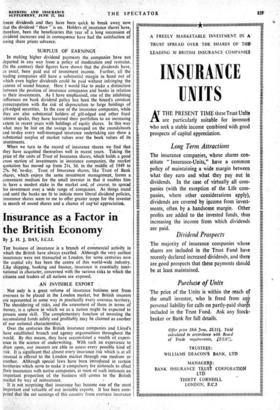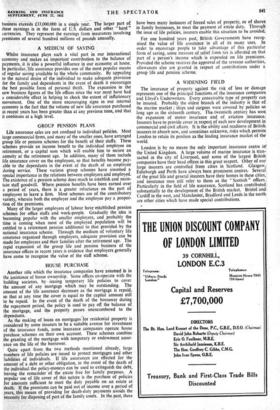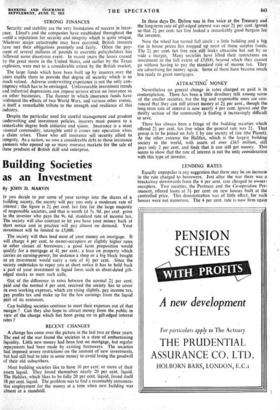Insurance as a Factor in the British Economy
By J. H. J. DAY, F.C.I.I.
THE business of insurance is a branch of commercial activity in which the British have always excelled. Although the very earliest insurances were not transacted in London, for some centuries now the capital city has been the centre of this world-wide industry. Like shipping, banking and finance, insurance is essentially inter- national in character, concerned with the various risks to which the citizens and traders of all nations are exposed.
AN INVISIBLE EXPORT
Not only is a great volume of insurance business sent from overseas to be placed in the London market, but British insurers are represented in some way in practically every overseas territory. The shouldering of risks, and the assessment of them in terms of money, is a sphere in which we as a nation might be expected to possess some skill. The complementary function of investing the accumulated funds safely and profitably may be claimed as another of our national characteristics.
Over the centuries the British insurance companies and Lloyd's have established branch and agency organisations throughout the world. By this means, they have accumulated a wealth of experi- ence in the science of underwriting. With such an experience to draw upon, our insurers are able to assess every possible kind of risk. It is significant that almost every insurance risk which is at all unusual is offered to the London market through one medium or another. Although special laws have been introduced in certain territories which serve to make it compulsory for nationals to effect their insurances with native companies, in most of such instances an important proportion of the business still comes to the British market by way of reinsurance.
It is not surprising that insurance has become one of the most important and valuable of our invisible exports. It has been com- puted that the net earnings of this country from overseas insurance business exceeds £33,000,000 in a single year. The larger part of these earnings is in the form of U.S. dollars and other " hard " involving premiums They represent the earnings from insurances nvolving premiums of several hundred millions of pounds annually.
A MEDIUM OF SAVING Whilst- insurance plays such a vital part in our international economy and makes an important contribution to the balance of payments, it is also a powerful influence in our economy at home. In particular, life assurance provides one of the most popular means of regular saving available to the whole community. By appealing to the natural desire of the individual to make adequate provision for the family and dependants in the event of death it encourages the best possible form of personal thrift. The expansion in the new business figures of the life offices since the war must have had a considerable effect in helping to check the extent of inflationary movement. One of the more encouraging signs in our internal economy is the fact that the volume of new life assurance purchased in recent years has been greater than at any previous time, and that it continues at a high level.
GROUP PENSION PLANS Life assurance sales are not confined to individual policies. Most large commercial firms, and many of the smaller ones, have arranged group life or pension schemes for the benefit of their staffs. These schemes provide an income benefit to the individual employee on retirement, or a capital sum which will enable him to secure an annuity at the retirement age. In addition, many of them include life assurance cover on the employees, so that benefits become pay- able to the dependants in the event of the death of an employee during service. These various group schemes have assumed a special importance in the relations between employers and employed. The existence of a pension scheme does much to establish and main- tain staff goodwill. Where pension benefits have been earned over a period of years, there is a greater reluctance on the part of employees to leave a firm. Most schemes are of the contributory variety, wherein both the employer and the employee pay a propor- tion of the premiums.
Many of the larger employers of labour have established pension schemes for office staffs and work-people. Gradually the idea is becoming popular with the smaller employers, and probably the time is coming when most of the employed population will be entitled to a retirement pension additional to that provided by the national insurance scheme. Through the medium of voluntary life assurance organised through employers, adequate provision can be made for employees and their families after the retirement age. The rapid expansion of the group life and pension business of the insurance offices in recent years is evidence that employers generally have come to recognise the value of the staff scheme.
HOUSE PURCHASE Another role which the insurance companies have assumed is in the assistance of house ownership. Some offices co-operate with the building societies, by issuing temporary life policies to cover the amount of any mortgage which may be outstanding. The amount of the life assurance decreases as the mortgage is repaid, so that at any time the cover is equal to the capital amount still to be repaid. In the event of the death of the borrower during the repayment period, the policy is used to pay off the balance of the mortgage, and the property passes unencumbered to the dependants. As the making of loans on mortgages for residential property is considered by some insurers to be a suitable avenue for investment of the insurance funds, some insurance companies operate house purchase schemes on their own account. These schemes combine the granting of the mortgage with temporary or endowment assur- ance on the life of the borrower.
Quite apart from the two methods mentioned already, large numbers of life policies are issued to protect mortgages and other liabilities of individuals. If life assurances are effected for the amount of a debt or other obligation, in the event of the death of the individual the policy-moneys can be used to extinguish the debt, leaving the remainder of the estate free for family purposes. A popular use of life cover of this nature is the purchase of policies for amounts sufficient to meet the duty payable on an estate at death. If the premiums can be paid out of income over a period of years, this means of providing for death-duty payments avoids the necessity for disposing of part of the family assets. In the past, there have been many instances of forced sales of property, or of shares in family businesses, to meet the payment of estate duty. Through the issue of life policies, insurers enable this situation to be avoided.
For one hundred years past, British Governments have recog- nised the value of life assurance in all of its many uses. In order to encourage people to take advantage of this particular form of saving, some measure of telief from tax is afforded on that part of a person's income which is expended on life premiums. Provided the scheme receives the approval of the revenue authorities, allowances also are granted in respect of contributions under a group life and pension scheme.
A WIDENING FIELD The insurance of property against the risk of loss or damage represents one of the principal functions of the insurance companies and Lloyd's Underwriters. Every conceivable type of property can be insured. Probably the oldest branch of the industry is that of the marine market ; ships and cargoes were covered by policies so long ago as the sixteenth century. The twentieth century has seen the expansion of motor insurance and of aviation insurance. Insurers have to provide cover in respect of each new development in commercial and civil affairs. It is the ability and readiness of British insurers to absorb new, and sometimes unknown, risks which permits London to retain its position as the leading insurance market of the world.
London is by no means the only important insurance centre in, the United Kingdom. A large volume of marine insurance is tran- sacted in the city of Liverpool, and some of the largest British companies have their head offices in this great seaport. Other of our large insurers are controlled from cities in Scotland. Glasgow, Edinburgh and Perth have always been prominent centres. Several of the great life and general insurers have their homes in these cities, and insurance men still refer to them as the " Scottish " offices.' Particularly in the field of life assurance, Scotland has contributed, substantially to the development of the British market. Bristol and. Cardiff in the west, and Manchester, Bradford and Leeds in the north are other cities which have made special contributions.
STRONG FINANCES Security and stability are the very foundation of success in insur- ance. Lloyd's and the companies have established throughout the world a reputation for security and integrity which is quite unique. i Whatever major catastrophe may have occurred, British insurers have met their obligations promptly and fairly. Often the pay- ment of several millions of pounds to overseas policyholders has followed some disastrous event. In recent years the losses caused by the great storm in the United States, and earlier by the Texas explosion, were met to a considerable extent by the British market.
The large funds which have been built up by insurers over the years enable them to provide that degree of security which is so much valued. Adverse underwriting experience is not the only con- tingency which has to be envisaged. Unfavourable investment trends and industrial depressions can impose serious strain on insurance as on other businesses. The manner in which insurance funds have withstood the effects of two World Wars, and various other events, is itself a remarkable tribute to the strength and resilience of this industry.
Despite the particular need for careful management and prudent underwriting and investment policies, insurers must possess to a remarkable degree both initiative and vision. Insurance is a most unusual commodity, intangible until it comes into operation when a claim arises. Those who sell insurance sell security allied to integrity. As a nation, we owe a considerable debt to those insurance pioneers who opened up so many overseas markets for the sale of these products of British skill and enterprise.




















































 Previous page
Previous page